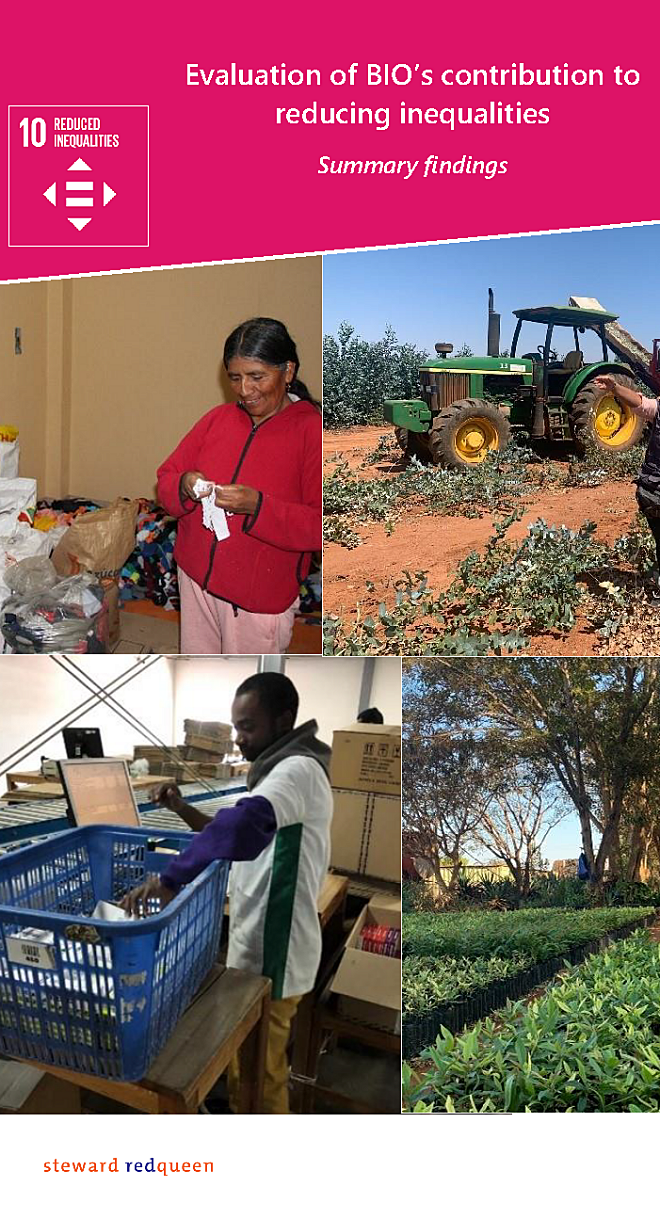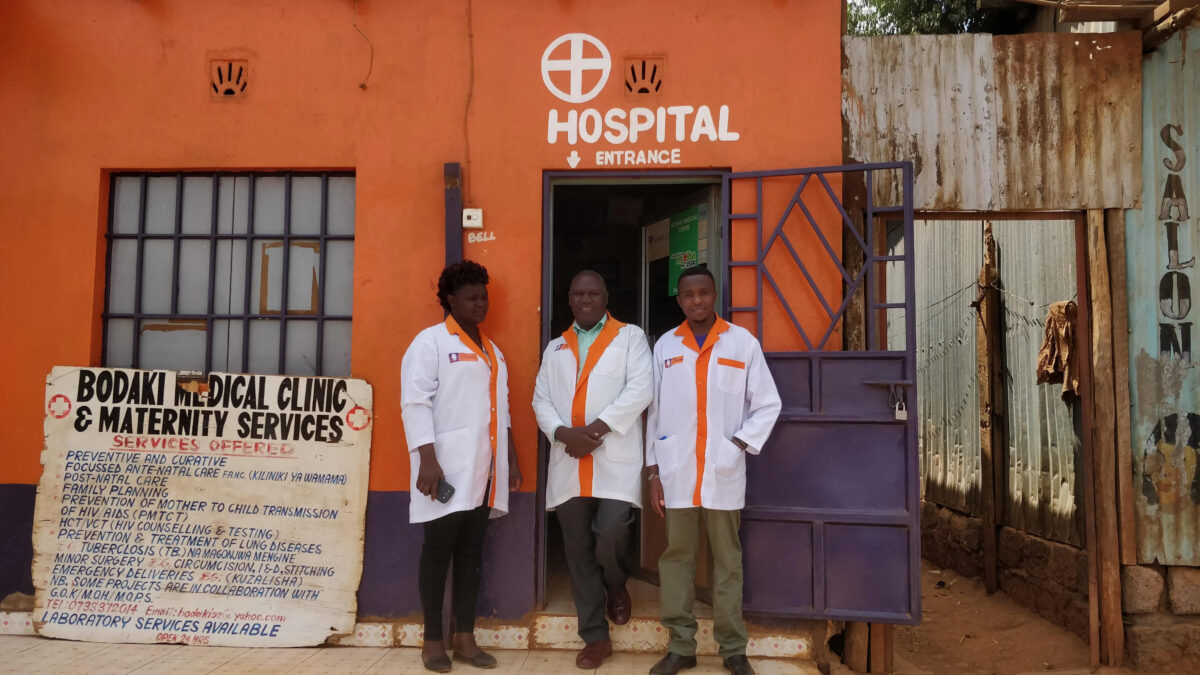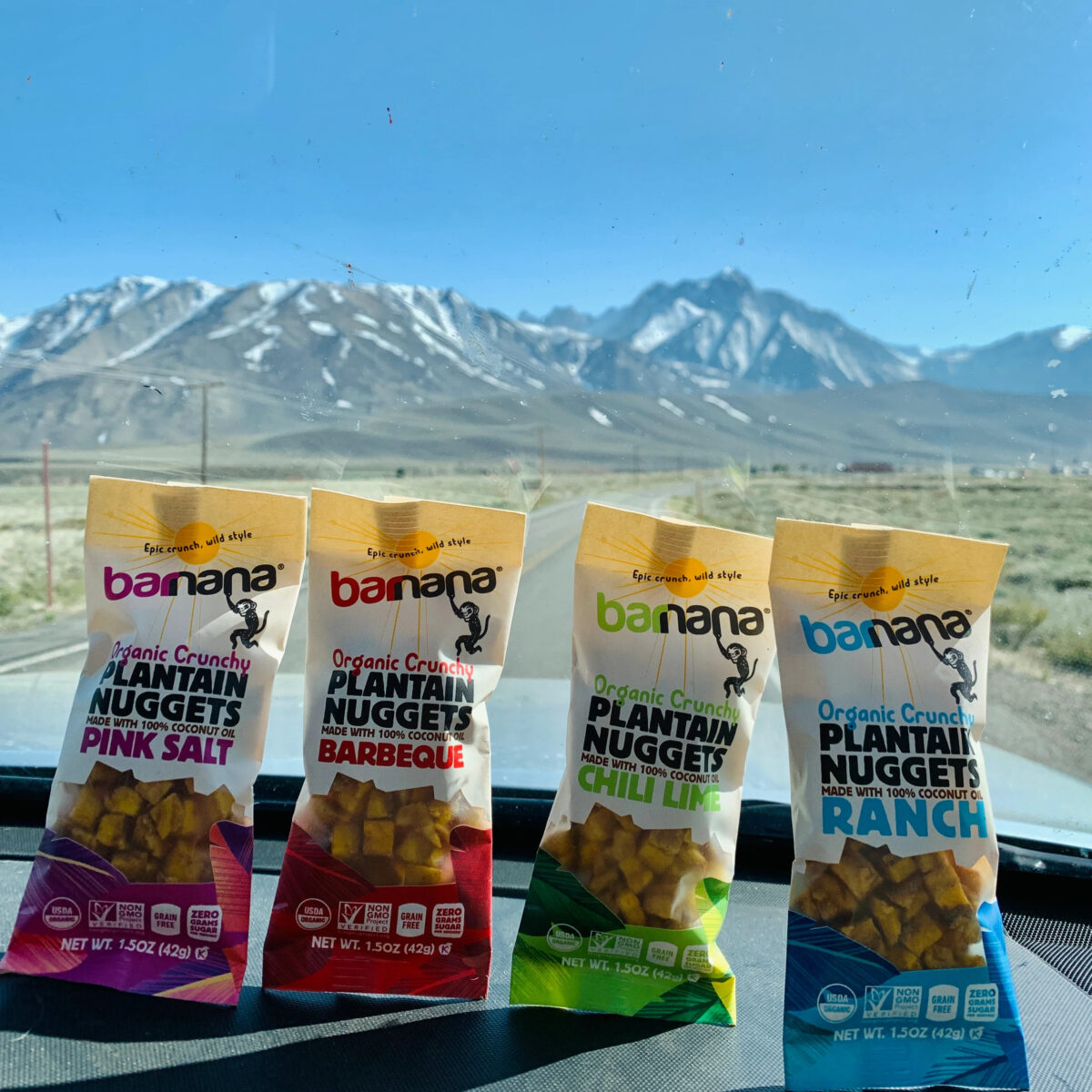Reduced inequalities
Through its strategies and operations, BIO seeks to foster a more equitable world and address disparities across various dimensions. Its contribution to reducing inequalities is a central subject and was extensively analysed and investigated by last external Case Study Evaluation.
SDG10 calls for reducing inequalities in income among and within countries, in addition to targeting inequalities on other factors such as age, sex, disability, race, ethnicity, origin, religion, or economic status. Inequalities continue to be a significant concern for developing countries despite progress and efforts to narrow disparities of opportunity, income, and power. Through its overall mission and specific interventions, BIO, alongside other DFIs, plays a significant role in reducing inequalities in income as well as in the above-mentioned other aspects, which, in turn, enables the realisation of other SDGs.
BIO seeks to address income inequalities between countries by investing in Least Developed Countries (LDCs) and fragile states, by enabling economic structural transformations stimulating employment, private sector growth and productivity, and by targeting inclusive businesses (e.g. microfinance institutions, smallholder finance, agribusiness with smallholders, gender-smart investment, off-grid power and solar-home systems, etc.). By triggering economic growth in low-income settings but also by directly targeting the bottom 40% of the population, amongst others through inclusive businesses, BIO’s interventions aim at supporting reducing inequalities within countries.
BIO is also combatting discrimination and inequality by supporting equal opportunity and protection for all the impacted stakeholders – including vulnerable consumers or communities – by promoting high environmental and social standards. This is done by imposing strong requirements regarding client protection, community health, safety and security, and land acquisition and resettlement.

Reducing inequalities between countries
The 2022 external evaluation focused on BIO’s contribution to SDG10 - reducing inequalities.
In December 2021, BIO had EUR 465 M outstanding investments in 89 enterprises, mainly in sub-Saharan Africa, and indirectly EUR 209 M, through investment funds, in 545 companies.
About one third (EUR 224 M) of its total outstanding portfolio (targeting 223 enterprises, i.e. 35% of BIO’s total indirect final beneficiaries) is in least developed countries (LDC) and so-called fragile states. This is significantly higher than other European development finance institutions and seeks to contribute to reducing inequalities among LDCs and more developed countries.
In total, 40% of BIO’s direct investment volume goes to businesses that contribute to reducing inequalities within countries, mostly in very inegalitarian countries.
About one third of the capital indirectly invested by BIO helps to substantially alleviate disparities within a nation. This mostly pertains to investments in agriculture, MFIs, and off-grid and community-based energy projects, as these businesses are more likely to engage the poorest people as staff members, suppliers, distributors, retailers, or consumers within their value chains, ensuring a wide impact.
Overall, the companies supported by BIO in LDCs and fragile states create or maintain around 29,000 jobs, providing a total of EUR 164 M in wages in 2021. These investments play a vital role in promoting economic opportunities and reducing inequality in these countries.
Five of the 23 investment projects that were approved in 2022 were in least developed countries, and 19 had financial inclusion, rural development or access to basic goods and services as a primary objective.
In BIO’s portfolio, 21 of the 71 directly funded companies, and 119 of the 426 indirectly funded companies, are in least developed countries. In 2021, these companies contributed respectively EUR 537.2 M and EUR 423.4 M in tax revenues to their local governments. This is crucial because governments have a major redistributive role with respect to social and economic inclusion, healthcare, and education. Taxes and social contributions from BIO’s clients enable them to honour these commitments.
As part of the independent evaluation on BIO’s contribution to reducing inequalities, some projects have been analysed in detail with a focus on their contributions to SDG10. This is the case for Ilara Health, an investee of TIDE Africa LP that provides diagnostic tools to small and ill-equipped primary healthcare providers in Kenya, as well as for Barnana, an Ecuadorian agriculture processing company that BIO supports through its investment in EcoEnterprises Partners Fund, and for Banco Solidario, an Ecuadorian microfinance institution that focuses on financial and social inclusion.

The study shows that BIO has a clear focus on reducing inequalities, but would benefit from adopting a more explicit approach in the future - which we are now actively working on.

Ilara Health
While the Kenyan healthcare ecosystem counts many small providers, quality healthcare is either unaffordable or unavailable for the low to middle income population. That is why, in 2019, Ilara Health started to equip a network of ill-equipped primary healthcare providers in Kenya’s suburbs with lifesaving and essential diagnostic tools to improve the quality of medical care provided. The clinics supported by Ilara are decentralised and mostly present in peri-urban agglomerations, including poor suburbs and townships. Ilara reaches low to middle income patients who live with 5 to 10 dollars a day. 58% of its patients are women and about 20% are younger than 5 years old.
Since 2019, Ilara has increased its product range to quality medications, non-diagnostic equipment, and digitalisation services for the clinics’ information systems; they are now looking to expand geographically in Africa, starting with Ghana.
To support this expansion, Ilara has raised funding from multiple investors, including the Tide Africa Fund, in which BIO has invested. TLCom, the fund manager of the TIDE Africa Fund, assists Ilara by joining its board and by providing financing and helping in raising patient capital. For example, the TLcom investment supported Ilara in hiring a compliance lead to ensure that all equipment provided is in line with industry best practices.

Barnana
In 2019, BIO invested in EcoEnterprises Partners III. They invest in agribusiness, agroforestry, eco-tourism, and aquaculture companies in Latin American countries that have good relationships with local communities.
Barnana sells a range of organic banana and plantain-based snack products to wholesalers and leading retailers. In 2021, they acquired AgroApoyo, their Ecuadorian supplier, further integrating the value chain.
AgroApoyo directly supports over 60 communities by sourcing from nine agrosocial association, helping smallholder farmers to become organically certified.
Banco Solidario
Banco Solidario is a microfinance institution that targets un(der)served populations in Ecuador by providing both productive and consumption loans up to USD 20,000.
Solidario’s 53 agencies specifically focus on the vulnerable groups involved in commercial activities in urban and peri-urban areas.
In 2018, BIO provided a USD 10 million loan to finance Solidario’s microfinance portfolio. BIO's primary development goals identified for this investment include
- local economic growth by providing access to finance for microentrepreneurs and
- financial inclusion by providing access to finance for microenterprises with Banco Solidario’s good geographical coverage and range of accessible loan products.
BIO also supported Solidario with three TA projects between 2018-2022: the first one aimed at developing a credit management module for a financial education programme, the second helped the bank to develop digital outreach mechanisms, such as the mobile app and virtual assistant, and the third TA project targeted the measuring and benchmarking of Solidario’s gender equality practices through an Economic Dividends for Gender Equality radiography of the institution.
Client Protection Principles
The Smart Campaign was a global initiative launched in 2009 to make sure that financial services are delivered safely and responsibly to low-income clients. It developed the first global financial consumer protection standard, established a rigorous certification programme to validate practices by financial service providers, produced consumer protection research, and convened partners to effect change. Over the course of the programme more than 135 financial institutions, collectively serving more than 62 million low-income clients in 42 countries, were certified for adhering to the Smart Campaign’s Client Protection Standards. In 2020, the Smart Campaign was transformed into the “Client Protection Pathway” of Cerise and SPTF (Social Performance Task Force), that offers a roadmap for improved client protection practices. It also promotes Universal Standards for Social and Environmental Performance Management.
BIO requires MFIs to adopt the Client Protection Principles and the associated certification. To achieve this certification, the client is, amongst others, required to be transparent about the loan pricing and to adopt adequate measures to limit the risk of client over-indebtedness. In 2021, 11 out of the 24 microfinance institutions in BIO’s portfolio were Smart Campaign certified.

Cerise + SPTF
Over 20 years ago, Cerise+SPTF built the first version of the SPI tool in collaboration with purpose-driven organisations from the inclusive finance industry. In 2022, BIO helped them update it.
The upgraded version, SPI Online, offers resources and assessment tools for anyone with an interest in managing social and environmental performance—financial service providers, impact investors, regulators, auditors, and other types of social businesses. The platform contains the audit tools to help purpose-driven financial service providers as well as other social businesses track their progress related to their social and environmental objectives, and includes information and referrals for the other resources (technical, human, financial) necessary to that effort.
These tools are aligned with the third version of the Universal Standards for Social and Environmental Performance Management, and measure compliance with a range of leading international standards including the Sustainable Development Goals, the UN Global Compact, and standards developed by the ILO and OECD. The new platform is even more powerful as it allows standardised ESG measurement, which is the only way to prevent greenwashing and enable meaningful conversations on what works and does not work in ESG & Impact.
The data collected through the SPI online tool, which has more than 800 financial institutions users, enable the sector to analyse the state of the practices, to benchmark results, to understand gaps, and suggest improvements wherever necessary. The new tool encourages institutions to improve themselves. The work of impact investment is never completed, and BIO is proud to be part of it!
